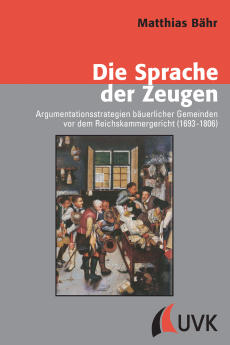Village Communities and their “Political Languages”

Drawing from a range of archival materials such as depositions and supplications, this book focuses on village communities and their “political languages” in 18th-century Germany. The author argues that at the supreme court of the Holy Roman Empire, village communities used three major strategies to oppose their bailiffs, feudal lords and princes. Firstly, by appealing to notions of liberty, they were often able to forge alliances with the Emperor against intermediate powers. Secondly, by claiming that unpopular political actions jeopardised their livelihood, they used contemporary economic concepts to their advantage. Thirdly, by constantly referring to tradition, they offered an alternative to scholarly concepts of law. These strategies were, Bähr argues, often successful because early modern courts of law were a matrix for mediation, and not just a device for top-down judgment.
Literature: Bähr, Matthias, Die Sprache der Zeugen. Argumentationsstrategien bäuerlicher Gemeinden vor dem Reichskammergericht (1693–1806) (Konflikte und Kultur – Historische Perspektiven, vol. 26), Konstanz et al.: UVK 2012.

